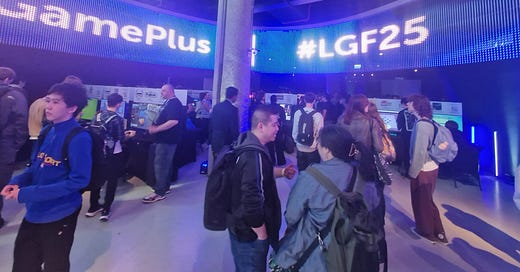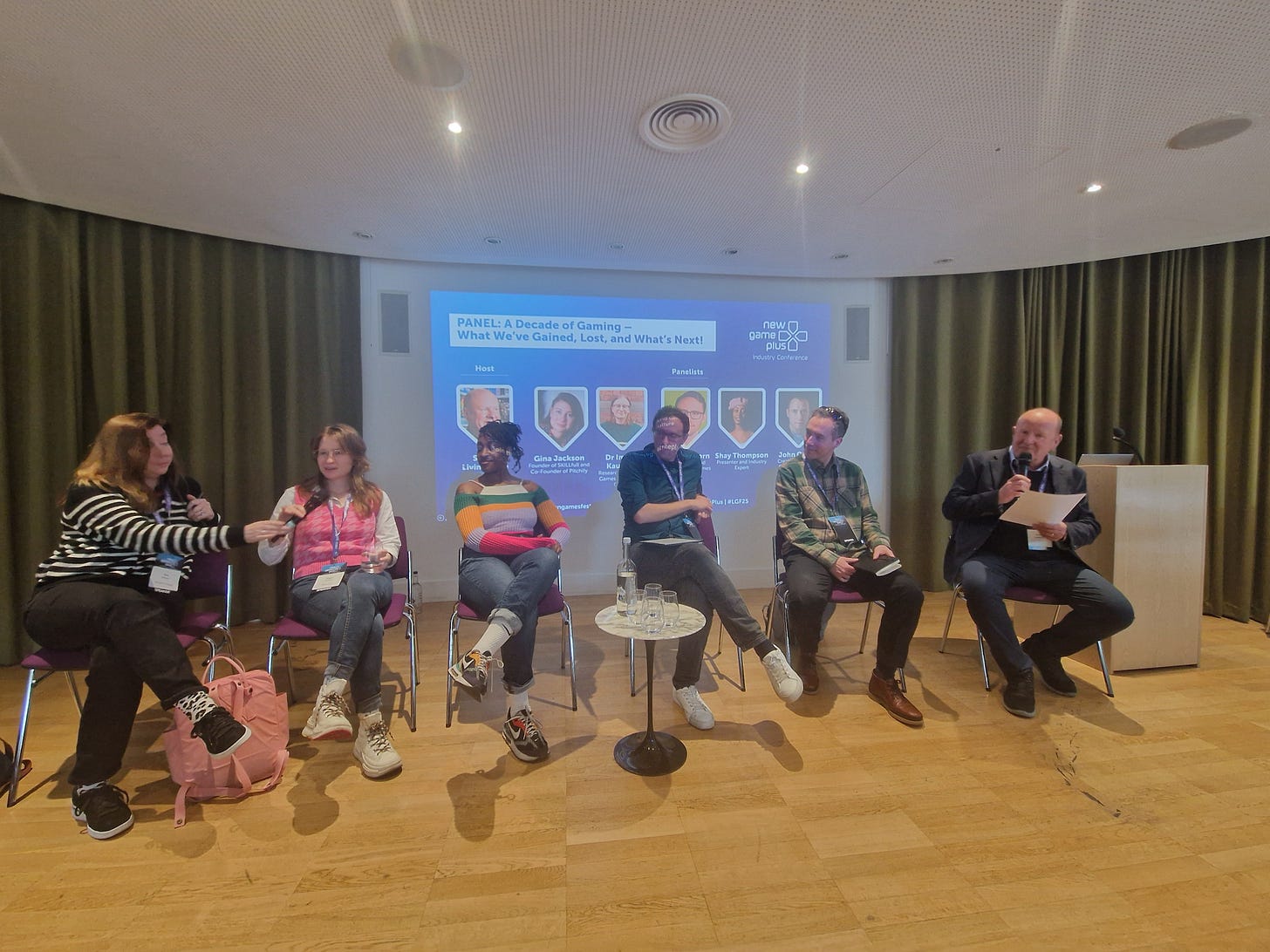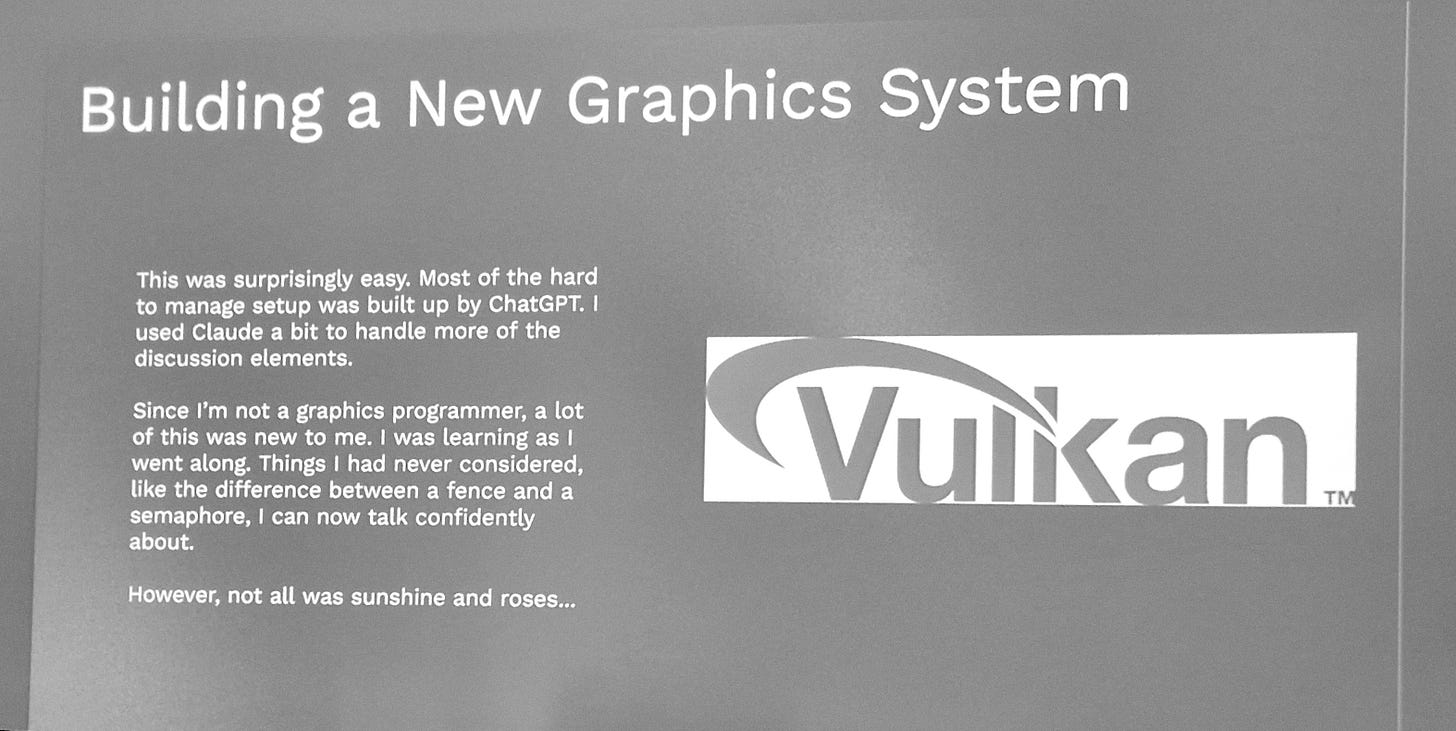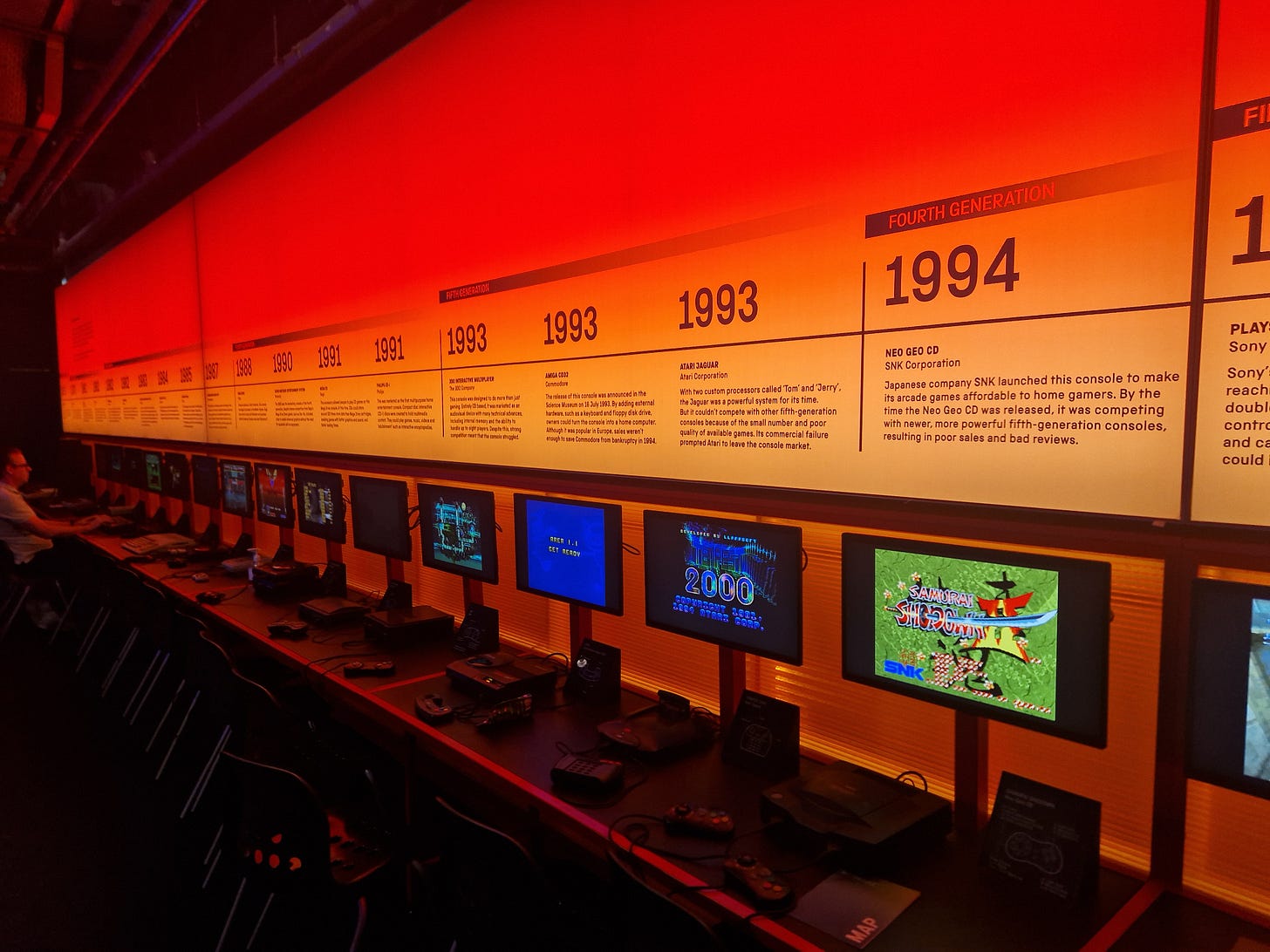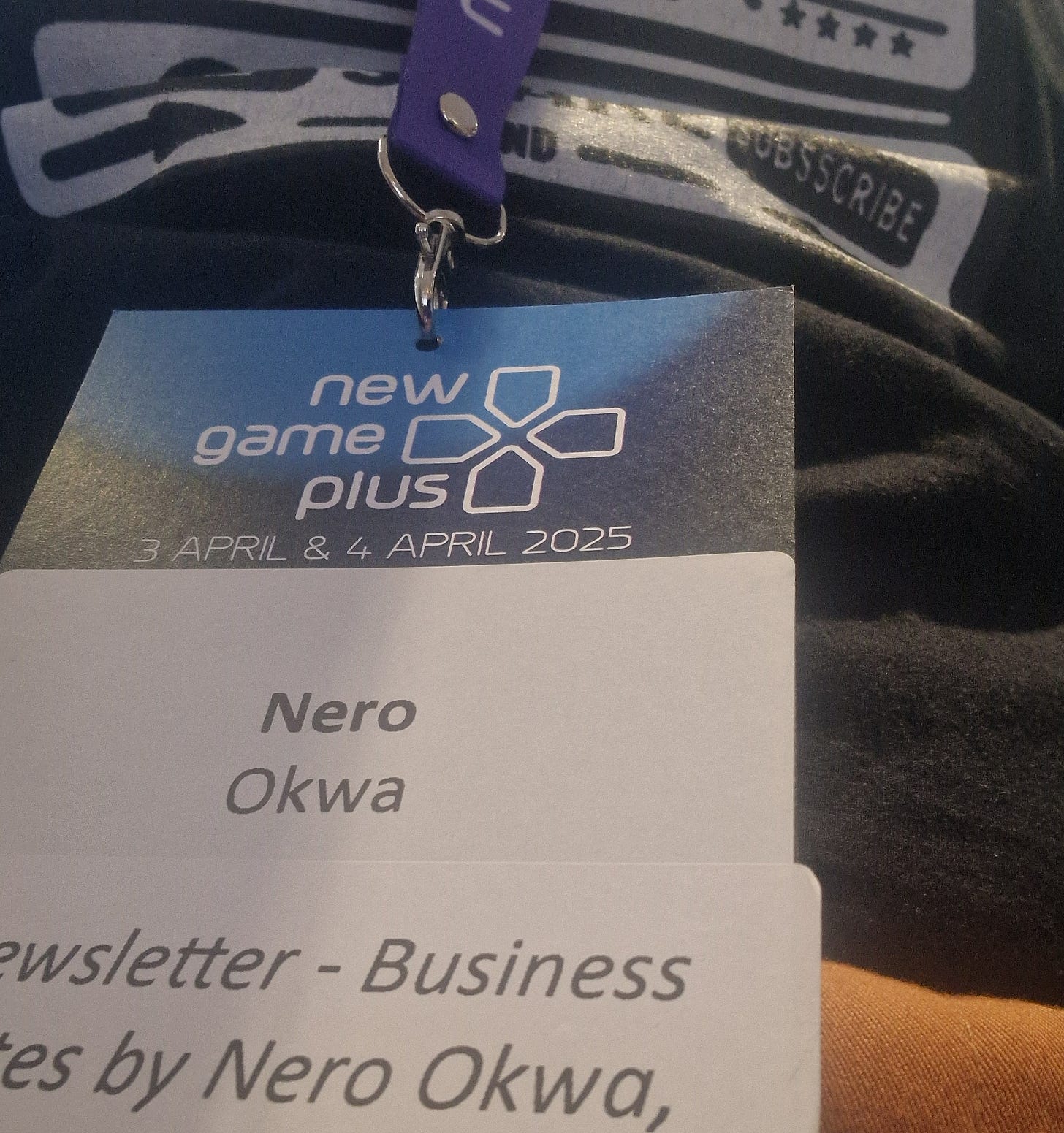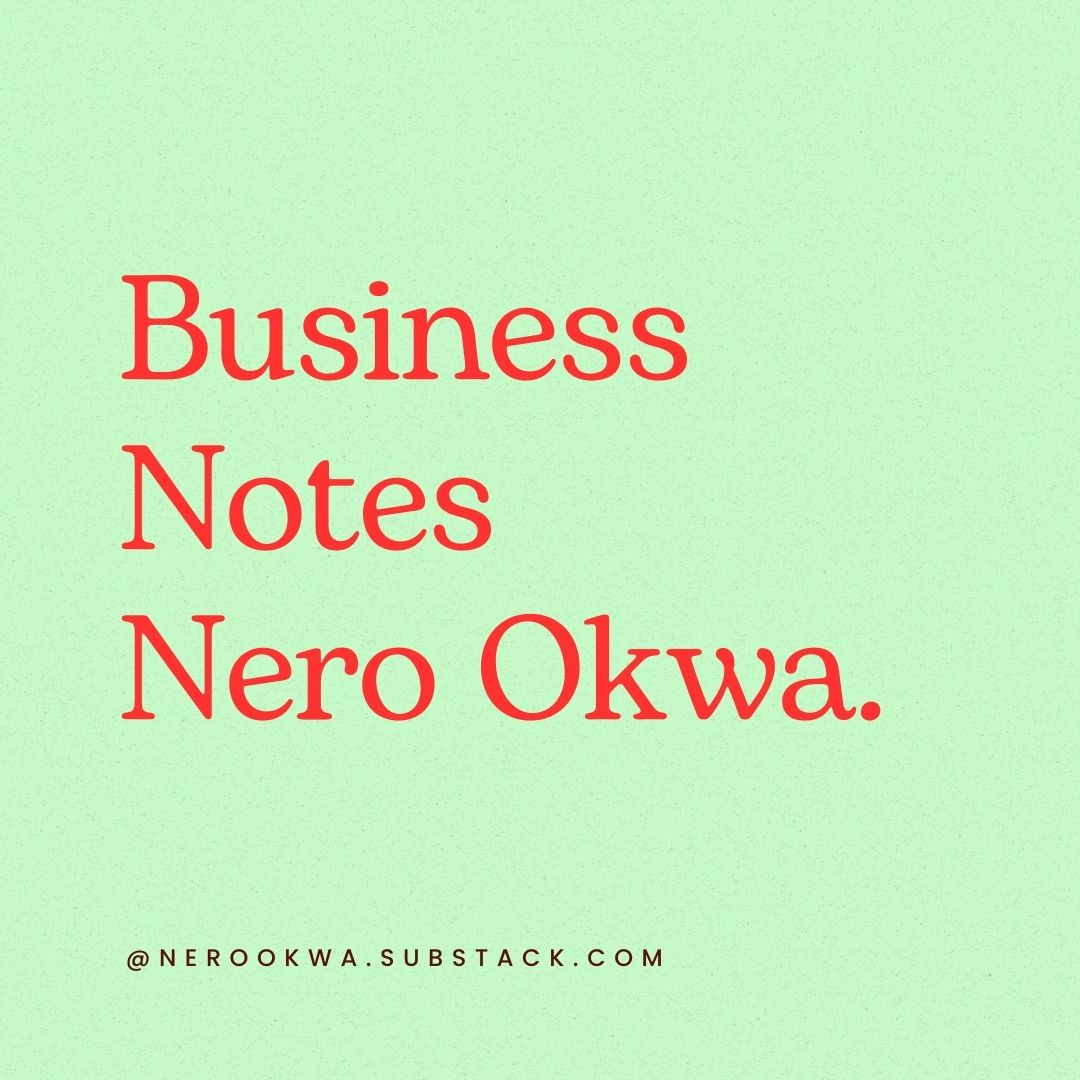#81. London Gaming Festival 2025: The UK's Hollywood of Video Games
What do Grand Theft Auto, Football Manager, and Tomb Raider have in common?
They are video games all created in the UK.
As the London Games Festival celebrates its 10th anniversary this April, it's time to recognize what industry leaders have been saying all along: the UK has its own Hollywood, and it's the video games industry.
In 2024, I attended the London Games Festival, and the Gaming sessions during London Tech Week. Last week I attended the London Games Festival 2025 edition. Today I would be writing about my experiences across all sessions, and why I believe the UK Games industry could be number 1 in the world.
A Global Gaming Powerhouse
The statistics revealed on the eve of this year's festival are nothing short of impressive. London has risen to become one of the top three global cities for games development, second only to Los Angeles and San Francisco. With a workforce of over 13,700 games professionals, London has overtaken Canadian hotspots and most US cities, cementing its place as the #1 games hub in Europe.
Consider these numbers:
Over 25% of the UK's total games workforce is based in London
More than a third of the UK's games contractor workforce calls London home
Nearly 50% of all UK games R&D jobs are in the capital
As Nick Poole of Ukie noted during last year's event at London Tech Week, "We are a powerhouse. But we are hiding our light under a bushel, we have a Hollywood in the UK but are hiding it."
Inside the 10th Anniversary Festival (2025)
The tenth annual London Games Festival kicked off on April 2nd with an impressive line-up of nearly 60 games showcased between New Game Plus, BAFTA Games Awards, Games Finance Market investor event. Trafalgar Square event, and many others running until April 13th. At the opening session, London's Deputy Mayor for Culture and Creative Industries, Justine Simons OBE, shared some remarkable achievements:
Games London has delivered over £100 million of direct inward investment and created over 900 jobs in less than a decade
London now hosts over 700 games businesses
20 educational institutions now offer games courses
The Mayor of London has committed to funding the Games Festival for another four years
On Thursday 3rd of April, I attended 3 sessions at the New Game Plus event. These were focused on industry events and the business of gaming. There was also an expo for new games from game studios across the UK.
Session 1 - A Decade of Gaming: Looking Back and Forward
Perhaps the most thought-provoking session was the panel "A Decade of Gaming – What We've Gained, Lost, and What's Next," hosted by Sir Ian Livingstone alongside industry experts including Gina Jackson OBE, George Osborne, Dr. Imo Kaufman, Shay Thompson, and John O'Shea.
The panel reflected on gaming's cultural evolution over the past decade while making predictions for the next ten years that will be stored in a time capsule at the National Videogame Museum until 2035.
Key insights from the panel:
On industry growth: George Osborne noted that the industry grew from $97 billion ten years ago to $107 billion today, indicating market maturation
On UK ownership: A common thread was concern that many successful UK-made games like GTA and Football Manager are foreign-owned, raising questions about how the UK can retain more value
On gaming's cultural impact: While games have entered mainstream culture, mass media often still portrays gaming as either harmful or only for "whiz kids"
On government support: Australia's model of providing progressive funding at different stages was highlighted as an example the UK could follow
On preservation: John O'Shea emphasized the need for better digital archives so historical games remain playable for future generations
Looking to 2035, panellists predicted more cross-platform play, innovative control mechanisms beyond traditional controllers, and growth in user-generated content platforms.
Gina Jackson hoped for more natural interaction with games: "the biggest transformation is not the hardware, but how we interact with the hardware... about speech and you can become a better talker to characters – it would level the playing field."
Session 2 - Building Games From Scratch With AI

One of the most fascinating sessions this year was Ken Noland's case study on "Building a Game from Scratch with AI," (read more here) where he detailed rebuilding OpenXcom’s game engine using AI in just three months. As CEO of AI Guys, Noland demonstrated how AI-assisted development enabled a single engineer to complete work that would typically require a full team and 20-24 man-months:
The AI-assisted project achieved a 416% frame rate increase
Over 1,800 source files were created or modified
AI streamlined Vulkan integration, UI scripting, and debugging
While Noland emphasized that "AI is not at the level of writing entire games," he demonstrated it's now at a level where "it needs an experienced engineer to tell it what to do." This case study proves that AI-assisted engineering is empowering solo developers and small teams to complete large-scale projects faster and more efficiently.
A fun fact was how the modern breakthroughs in AI came from gaming, in the UK. In 2001 Sir Demis Hassabis (now co-founder of DeepMind, acquired by Google) while working on the game Black and White, began rethinking neural nets, paving the way for the creation of Word2vec, which was picked up by a small company at the time known as OpenAI .
Session 3 - Business Foundations: Legal Issues for Games Companies
The festival also addressed practical concerns for studios with the "Key Legal Issues for Games Companies" panel, highlighting crucial elements for business success:
Ensuring proper IP ownership
Structuring share capital and option grants
Understanding investor term sheets and publishing deals
Celebrating British Excellence: BAFTA Games Awards
This year's BAFTA Games Awards, held on April 8th during the festival, saw "Thank Goodness You're Here" take home the award for Best British Game. Developed by Coal Supper, it was praised as "a gloriously funny, joyful, and properly Yorkshire game that absolutely deserves every bit of recognition it's getting."
You can see all the awards here.
Gaming Through the Ages
One of the events of the festival is the Science Museum's "Power Up" interactive gallery, offering visitors the chance to experience five decades of iconic video games across over 160 consoles. From the 1976 Binatone TV Master to the Atari 2600, Commodore 64, Sega Dreamcast, and PlayStation 2, the exhibition showcased the remarkable evolution of gaming hardware, graphics quality, and storytelling.
Lessons from Last Year's Festival
Looking back at the 2024 London Gaming Festival, several key themes emerged that continue to resonate:
The Economic Impact
The UK gaming industry generates over £6 billion annually for the economy, as highlighted during the closing remarks of last year's conference. This makes it not just a creative powerhouse but an economic one as well.
George Jijiashvili of Omdia provided a global perspective, noting that consumers spent more on gaming ($174bn) in 2023 than on online video ($128bn) or music ($30.4bn). This underscores why gaming is increasingly important as an entertainment medium.
Industry Challenges
The "Growing Games Studios Panel" featuring industry leaders like Maria Sayans (CEO of ustwo Games) and James Dobroski (MD of Sharkmob) discussed the industry's economic realities. The panel addressed salary inflation, cost management, and the importance of disciplined business practices.
James Dobroski shared an insightful perspective: "We tend to overindulge in times of excess and the opposite in times of scarcity." He expressed hope that "we will see new studios coming up" and that "investments are smarter, more independent company, better innovation."
The AI Revolution
One of the most discussed topics was the integration of AI in game development. The "AI and Games Panel" and "AI & Games, The State of Play" sessions explored how studios are using AI for early ideation and development.
However, speakers also highlighted concerns around AI implementation:
Quality and appropriateness of tools
Ethical considerations and potential blowback
Legal uncertainties, particularly with the EU AI Act
Sustainability of AI service providers, many of which are tied to subscription models that may not align with multi-year game development cycles
As one speaker noted, "Please care more about the artist" when implementing AI solutions.
Discoverability in a Crowded Market
The "How do you solve a problem like discoverability?" panel offered practical advice for game developers trying to stand out:
Target your audience and understand what your channels are for
Focus on building a community with journalists and influencers
"The best way to get your game discovered is to make a game that appeals to an audience and offers something compelling"
User-Generated Content (UGC)
The festival also highlighted the growing importance of UGC in gaming, with Roblox serving as a prime example with 71.5 million daily active users across 190 countries. The session emphasized that "the community is the powerhouse of your experience."
The Hidden Hollywood: Unlocking the UK's Potential
The UK gaming industry resembles Hollywood in its economic and cultural impact, but lacks the same level of public recognition and support. As the London Games Festival continues to grow in prominence, perhaps it's time for the UK to fully embrace its role as a global gaming powerhouse.
The message is clear: the UK doesn't need to build a Hollywood—it already has one in its thriving games industry. What it needs now is to harness this potential through strategic investment, skills development, and public recognition.
Building the UK's Gaming Hollywood: What Needs to Be Done
For all its success, the UK gaming industry faces significant challenges in realizing its full potential as the world's "Gaming Hollywood." From last year's discussions and this year's panels, several key actions emerge:
1. Comprehensive Funding Structure
George Osborne pointed to Australia's model as an example: "If you are setting up a game company, there is a great conveyor belt of government funding at different stages – from coming out of the university and getting prototype funding, and then advancing to higher level federal funding."
The UK needs a similar A-to-Z funding approach that supports studios from concept to market.
2. Cross-Industry Collaboration
As the success of gaming adaptations like the Minecraft movie demonstrates ($163 million opening weekend), there's immense potential in cross-industry collaboration. Gina Jackson noted that transmedia projects "bring the TV and movie industry to us. It enables us to have a better seat at the table."
The UK's established film, television, and literature industries could forge stronger links with games, leveraging shared creative talent and storytelling expertise.
3. Diversity and Inclusion
The panel highlighted troubling statistics: only 20-22% women in the industry, 10% People of Color, and just 2% Black representation. As George Osborne put it, the industry needs to start "stating it as a strategic value" with tactical implementation.
A more diverse workforce would bring fresh perspectives and help games reach broader audiences.
4. Preservation and Heritage
John O'Shea from the National Videogame Museum emphasized the need for better preservation: "What's needed is a stakeholder model where everyone is thinking about how we care for the materials in ways that researchers can access." Digital archives ensuring games remain playable are crucial for preserving this cultural heritage.
5. Public Recognition
As Nick Poole of Ukie noted last year, "We are a powerhouse. But we are hiding our light under a bushel, we have a Hollywood in the UK but are hiding it." George Osborne echoed this sentiment, hoping the industry would "stop looking at its shoes, and looking at the Horizon."
Greater public awareness and pride in the UK's gaming achievements would build momentum for policy support and investment.
As Justine Simons OBE reminded attendees at this year's opening: "As ever, we can't rest on our laurels, there are always many challenges and fierce competition. But so far London has remained resilient and with the talent and momentum we have, we can build a bright future for this amazing industry."
Until next time.
Nero
The Best is Yet to Come
You can read more on the UK’s video game and tech sector: #66. London Tech Week 2024. If you enjoyed this article, you would also enjoy Nero’ Weekly, What Does It Take to Build a Successful Startup? and Sam Walton Made in America. My Story.
You can subscribe now to receive all 80 of my articles including deep dives and career articles, technology and product articles, business breakdowns, and book reviews.
Is there a topic you currently struggle with? Let me know. You can message me at notesbynero@gmail.com.

